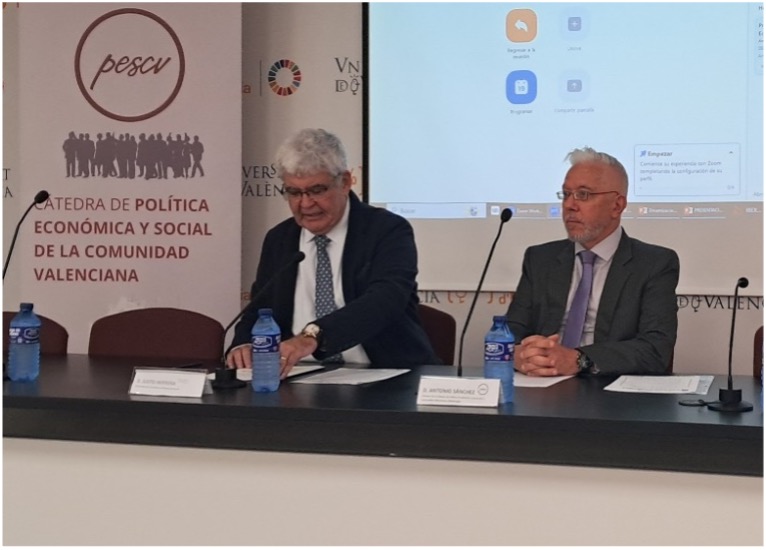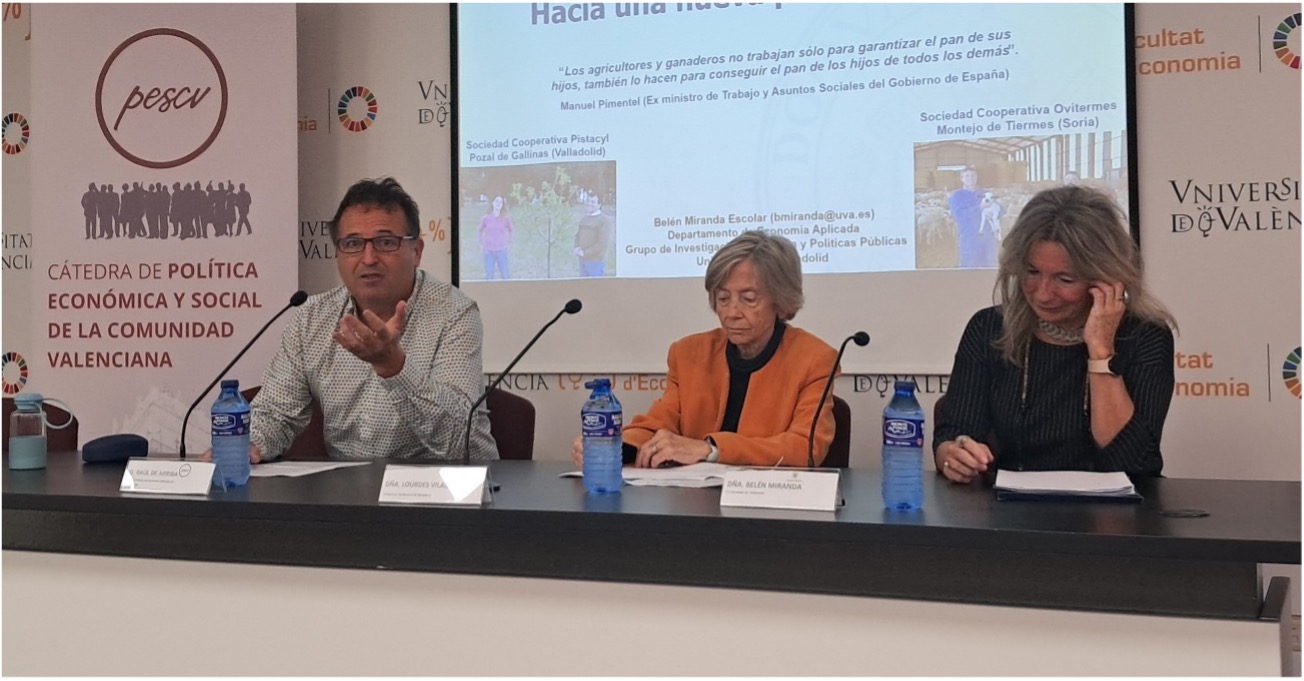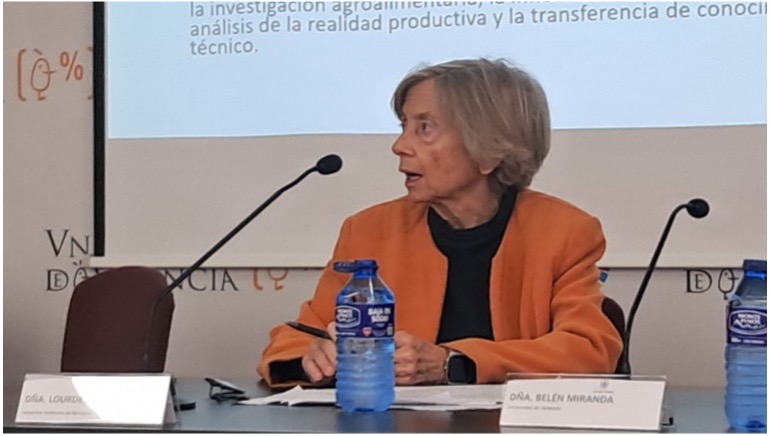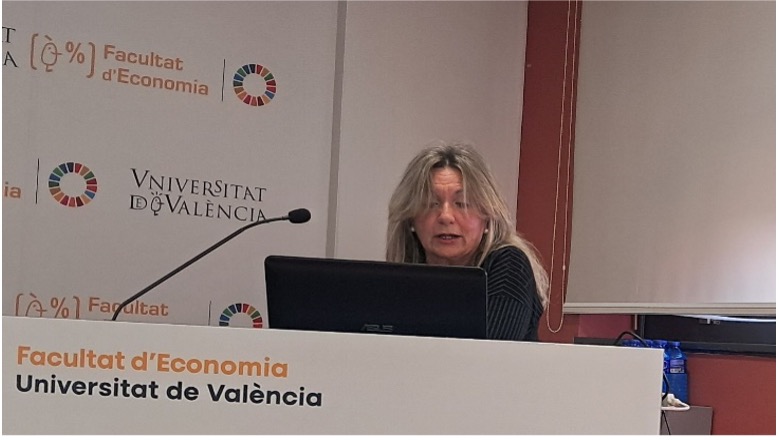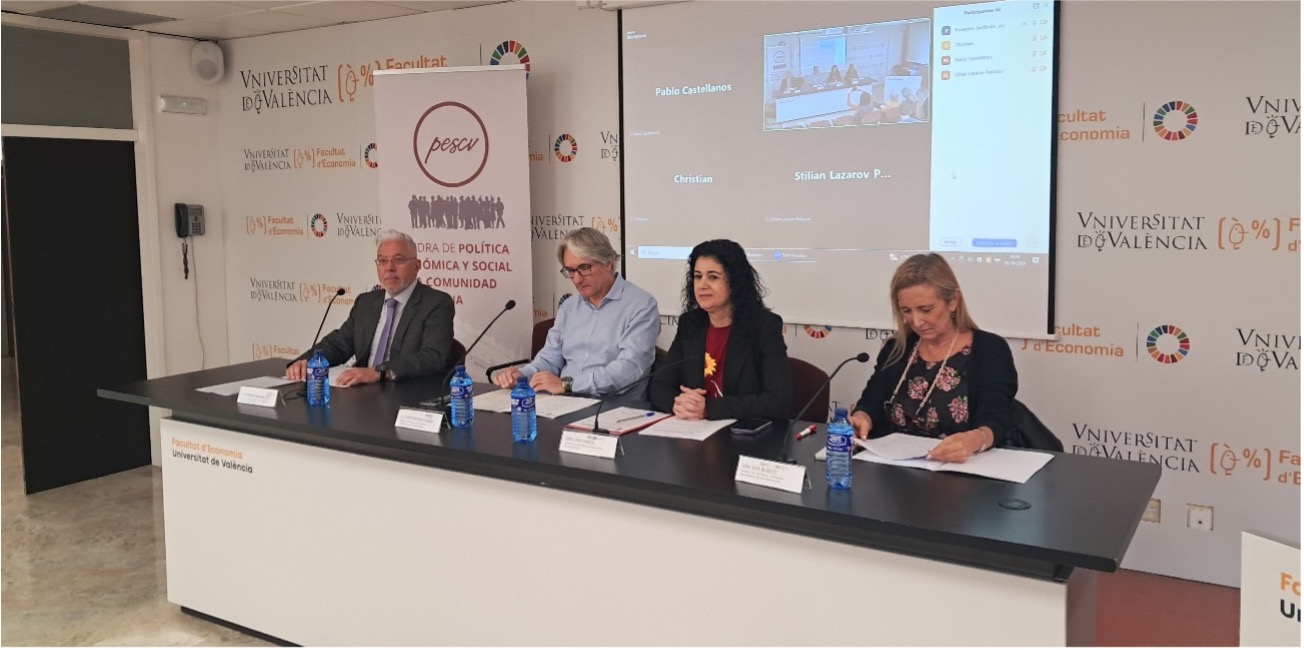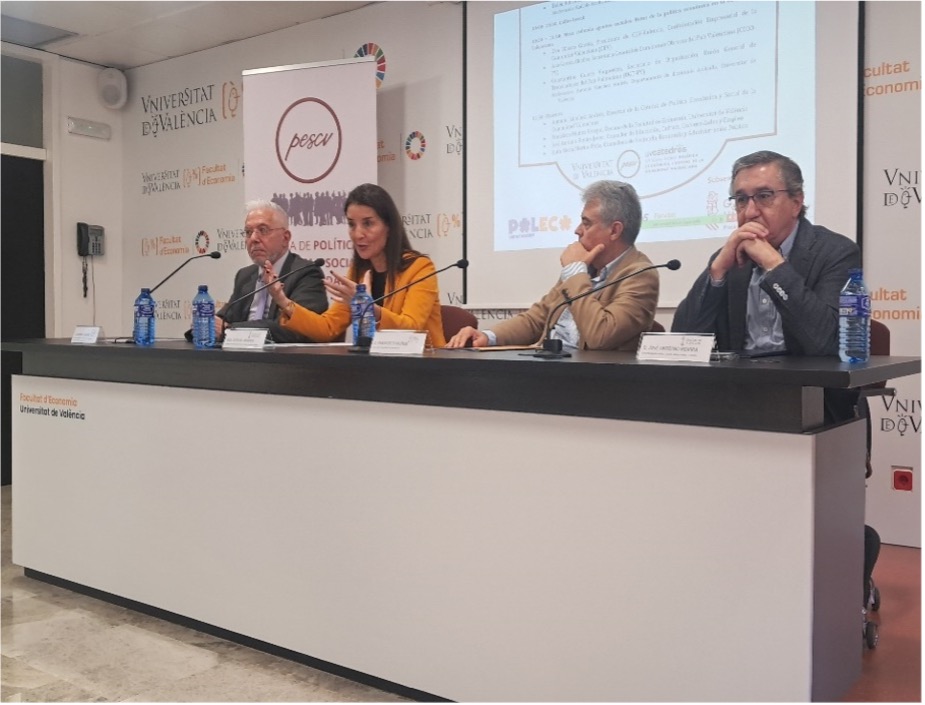The Chair for Economic and Social Policy of the Valencian Region will be presented on 28 October 2024 at the Ignasi Villalonga Room of the Faculty of Economics.
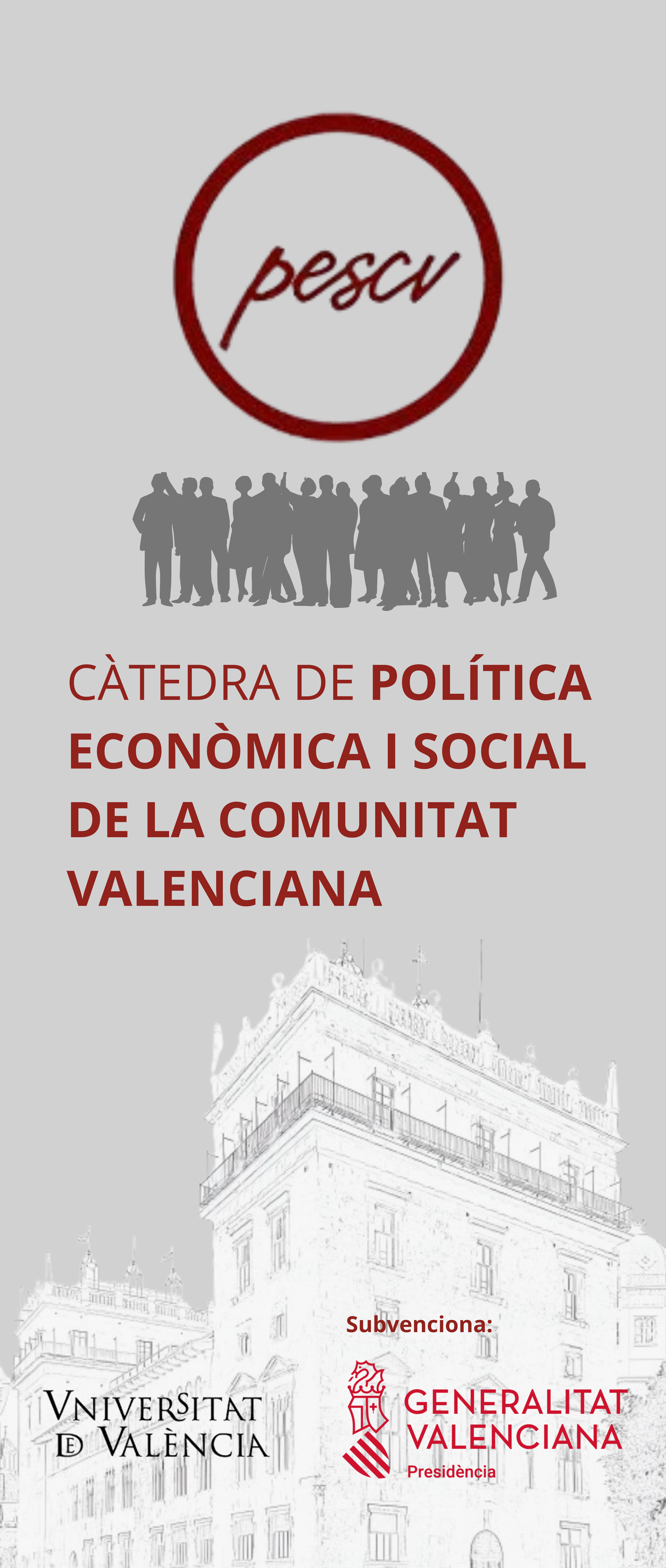
Location:
- On-site: Ignasi Villalonga Room (First Floor, Faculty of Economics, Tarongers Campus, Universitat de València)
- Online: https://links.uv.es/KGXb906 Access code: 921352
Programme
9:00 - 9:15 - Presentation of the Chair
- Antonio Sánchez Andrés, Director of the Chair for Economic and Social Policy of the Valencian Region
- Justo Herrera Gómez, Vice-Principal for Economics and Infrastructures, Universitat de València
9:15 - 10:00 - Panel discussion: Towards new agricultural policies
- Lourdes Viladomiu Canela, former professor at the Department of Applied Economics, Universitat Autònoma de Barcelona
- Belén Miranda Escolar, Department of Applied Economics, University of Valladolid. Moderated by: Raúl de Arriba Bueno, Department of Applied Economics, Universitat de València.
10:00 - 10:30 - Coffee break
10:30 – 11:30 - Social agents panel discussion: The challenges of economical politics in the Valencian Community
- Salvador Navarro Pradas, President of the Business Confederation of the Valencian Community (CEV)
- Ana García Alcolea, General Secretary of Comisiones Obreras of the Valencian Country (CCOOPV)
- Ismael Sáez Vaquero, General Secretary of the General Workers’ Uninio of the Valencian Country (UGT-PV). Moderated by: Antonio Sánchez Andrés, Department of Applied Economics, Universitat de València.
11:30 - Closing ceremony
- Antonio Sánchez Andrés, Director of the Chair for Economic and Social Policy of the Valencian Region
- Francisco Muñoz Murgui, Dean of the Faculty of Economics, Universitat de València
- Carlos Mazón Guixot, President of the Valencian Government
This event served as the official starting point for the Chair for Economic and Social Policy of the Valencian Region, verifying this new institution as a connection hub providing smooth communications between the political and institutional, the academic and the social worlds. On the same act, some recent activity of the chair for this 2024 was referenced. In fact, their main objective is to stimulate the creation of research, training and dissemination jobs related with Economic Policy, focusing on the knowledge transfer towards society as well as towards the decision-making fields. The ESP Chair has already started to support UV human resources to various projects, which will be enriched with the contacts developed from around twenty Spanish universities. The formation of this university network is key for the generation of ideas applied to reality.
After the opening by the Chair Director Antonio Sánchez Andrés and the Vice-Principal for Economics and Infrastructures of the UV Justo Herrera Gómez, the Universitat de València certifies its support, on behalf of Principal María Vicenta Mestre, to the creation of this space for debate and dissemination focused on the political action. The Vice-Principal enthusiastically highlighted the role of the chair in making the Valencian Community a competitive region, more attractive for investors and improving the situation for all Valencian people.
Following the presentation programme, a first panel discussion was established, moderated by Raúl de Arriba Bueno (Applied Economics – Economic Policy — UV) to tackle the new political trends and, in particular, to push towards “New agricultural policies”. For it, two frontline experts with ample experience were present; nothing less is to be expected for a frequently forgotten complex topic such as this one.
Lourdes Viladomiu Canela (Universitat Autònoma de Barcelona) spoke about the “Promotion of the agricultural sector, taking the Andalusian experience as an example”. On her presentation, she highlighted policies encompassing from accompanying financial entities specialised by sectors, to the R+D motors, agro-tourism and the multiservice cooperative unions.
Belén Miranda Escobar (University of Valladolid), pictured, conclusively, the state of the agricultural policies in Spain and Europe after the changes happening in the sector, which resulted in an outrage by the producers mobilised by the situation. Specifically, she indicated the need to use creative methods to rethink the Common Agricultural Policy based on the evaluation and local initiatives reinforced by the changes introduced after the two recent remodelling: the labour and the pension system. Nonetheless, she concludes that there are still many unresolved matters to be studied further.
A complete overview of Economic Policy must amply include the different social agents involved in its multiple phases. In order to do so, the chair presentation had a panel discussion moderated by Director Antonio Sánchez Andrés. On it, representatives from multiple trade unions were present, from the General Union of Workers (UGT-PV) and Workers’ Commissions (CCOO-PV) together with the Valencian Business Confederation (CEV-Valencia) and from the Valencian Community (CEV-CV). Specifically, we’ve had Constantino Calero Vaquerizo (Organisation Secretary, General Union of Workers from the Valencian Country), Ana García Alcolea (General Secretary of Workers’ Commissions of the Valencian Country) and Eva Blasco García (CEV-Valencia President).
Between the three social agents, a diagnosis about the economical politics challenges in the Valencian Community was drafted, mainly pointing out the need to stablish consensus and coordination in the political proposals reinforced by the changes introduced after the two recent remodelling: the labour and the pension system. Nonetheless, she concludes that there are still many unresolved matters to be studied further.
Additionally, they have identified a strong dependency of the tertiary sector, specifically, the hospitality industry. On the other hand, problems such as the infrastructures, underfunding, the small sizing of businesses, the excessive administrative bureaucracy and the accumulated debt impose restrictions when beginning: they prevent a growth in the industrial and entrepreneurial sectors. The existence of social gaps was emphasised as well, appearing due to the expansion of corporate profits and capital income, that led to the creation of workers with low purchasing power. This was aggravated by the rise in housing prices, influencing in the distribution of income. Facing this situation, the three agents agree on the need of an integral tax reform with a reconsideration of the autonomous funding model. On top of that, climate change and digitalisation will have serious impact on commerce, tourism, and on the labour market, all which require training and adaptation in the ways of working. A green transaction should be adapted to productivity and corporate deadlines, according to the members of the panel.
To close the chair presentation act, the political and institutional presence of Valencian Government as well as the speech from the Dean of the Faculty of Economics of the UV, Francisco Muñoz Murgui were relevant. The Valencian Government was represented at the event by José Antonio Rovira Jover, Minister of Education, Culture, Universities and Employment and Ruth María Merino Peña, Minister of Finance, Economy and Public Administration.
Their presence on the closing act itself justifies the interest of the Valencian Government in supporting the creation of the chair and verifies the commitment with its activities, linked to improving the decision-making process.
In the Dean words, one of the potentials of the chair is the possibility of inputting feedback back and forth between the activities of itself and the Master’s Degree in Economic Policy and Public Economics, showcasing the need of an institution such as this one on its commitment with knowledge transfer, training and interdisciplinary nature. He highlighted the chair as a space for cooperation between the public and private sectors, presenting them as communicative vases. Furthermore, the chair has the ability to convey its functions through the international prestige of the Universitat de València and its position in the research rankings. On this task, the chair’s team work is key, together with the support and funding from the Valencian Government. Following suit, director Antonio Sánchez presented again the results obtained by the chair over the last year. He highlighted that everything goes through Economic Policy. On this sense, this institution provides a space for the generation of ideas and content related to the socioeconomic problems of reality to go from the analysis of a contemplation economy to an action economy, consolidating the techno-political perspective.
For their part, both ministers, José Antonio Rovira and Ruth M. Merino, confirmed the commitment of the Valencian Government with the strengthening of public policies, through social innovation, and with the strategic need of creating thoughts, actions and collaboration from the chair. They’ve pointed that the functions of the recent institution are not limited to the analysis of economic policies and the projection of future options, but also include attempting to make open dialogue between agents. In order to do this, from within the chair the functions to be done by the project PES Forum, about Economic and Social Policies or the one about rehabilitation and re-training of public staff. However, on the same line, the design of their own courses and a new “Master’s Degree in Governing and Economic Policy” will be useful to face future challenges. Additionally, Ruth M. Merino highlighted that the economic policy is a priority for the Government of the President Carlos Mazón. Specifically, she pointed out the relevance of social politics for the social and economic progress, for which the Valencian Community gathers the ideal conditions. All in all, the creation of the chair would put in the forefront the value of the economic policies in the process of reaching such conditions.

Images:



